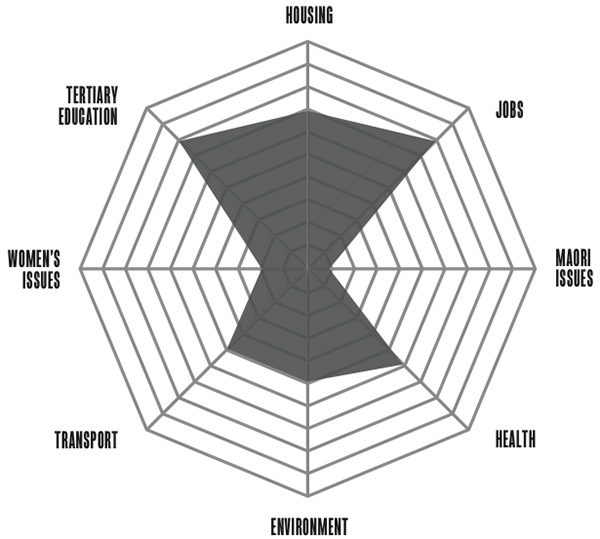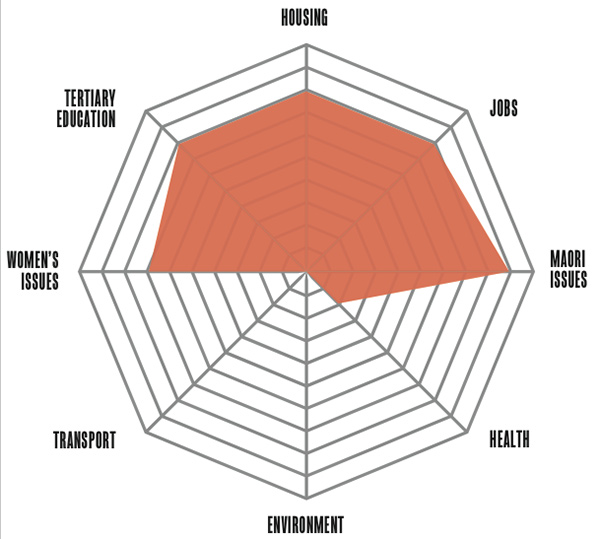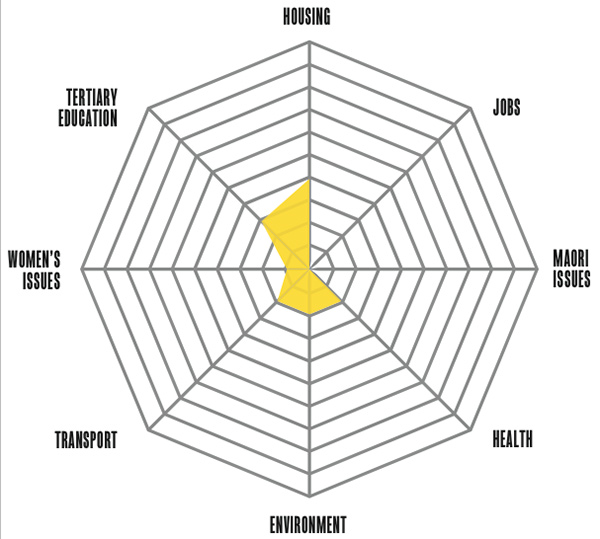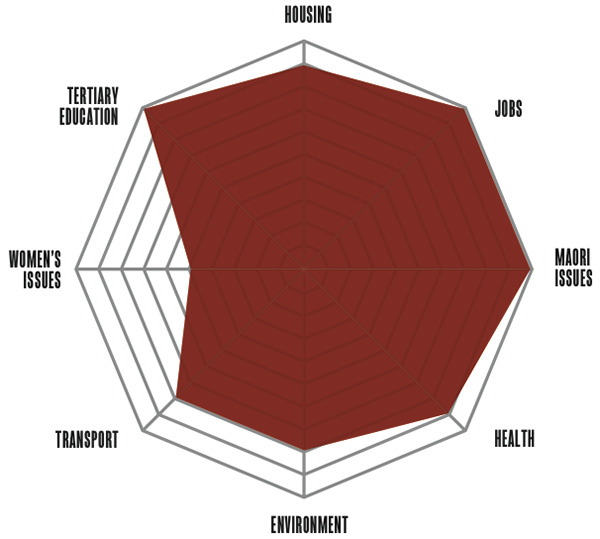Before you continue reading, know that we acknowledge that this analysis has a single focus, and this focus – students – is unique. Although it’s not often thought or expressed in this way, we students are some of the poorest, most dependent members of society, be it on our parents or the state. We take out loans to live, we don’t get paid for what we spend the majority of our time doing, and our entire futures are contingent on whether we’ll be able to gain employment to pay off our debts.
In this way, Critic defines “best” for each category in terms of security, and in terms of increasing our potential. Our panel of experts have had input on the blurbs that accompany each category, but it’s important to note that the student voice has been an integral part of this process.
Should our aim have been to pick out the parties that are best for corporations, business owners or doctors the results would likely be very different. But that wasn’t the aim and thus those weren’t the results. Building policy platforms for a party is about balancing the needs of an entire spectrum of demographics. Some are vulnerable and require a wide variety of support mechanisms; others thrive without the restrictions of government regulation. The difficult task of a party is to ascertain which members they intend to appeal to the most. Parties on the left appeal to those who require support, while those on the right appeal to those who aim to get ahead.
As it happens, students sit in the “need support” basket, and Critic’s analysis reflects this. As we grow, our needs will evolve and they’ll evolve at difference speeds. What is important is that this growth and opportunity begins at the same place for every student. A good student support system ensures that right here, and right now, our growth is not stunted.
Ultimately, this election is up to you, and whether or not you see “best for students” as “best for country” is your choice. We just hope you choose.
The National Party

Housing:
National’s housing policy focuses on first homebuyers and affordable housing, including freeing up more land and increasing lending to first homebuyers. These policies do not discuss the rental market of interest to students.Jobs:
The National party policy platform has a strong focus on the economy and job creation and growth. There have been, however, changes to the rights of workers that have reduced the protections in the job market, and only very small increases in the minimum wage.Maori Issues:
Chris Finlayson is the best Treaty negotiations minister we’ve ever had. That is a truth universally acknowledged. More historical claims have been settled in the last six years than under both the fifth Labour government and the fourth National government. However, inequality between Māori and Pakeha remains high and the government has done very little to correct it. The Māori unemployment rate is 13.2 per cent, which is double the national rate. For that reason, National only rates a 6.Health:
They want to move towards more “user pays” in health.Environment:
National party policies do not address the issue of carbon emission directly, and the party has been pursuing oil industry opportunities while in government. Commitment to the environment is constrained by economic imperatives:“We are committed to balancing our environmental responsibilities with economic opportunities to preserve and protect our natural environment.”
Transport:
Roads are the focus of National policy as this provides businesses with the most work. No profit in bus or rail services.Women’s Issues:
There is almost no sign that National is thinking about women. There’s a move towards strengthening enforcement of restraining orders, but nothing else. Their record while in government is not encouraging.Tertiary Education:
National has a strong focus on tertiary education for vocational and industry training. The National party in government has reduced the loans scheme and proposes to reduce student and staff representation on university councils.The Labour Party


Housing:
Labour proposes to implement a Healthy Homes Guarantee, that’ll require that every rental property is warm and dry.Jobs:
Labour promises to increase the minimum wage to $15 an hour and raise it again to $16.25 in 2015. Labour has a focus on the rights and conditions for workers including supporting collective bargaining and independent trade unions.Maori Issues:
The party of the Foreshore and Seabed Act 2004 has come a long way. As a symbolic gesture Labour plans to give formal recognition to Māori as the indigenous people of New Zealand (the party is unclear on the details, but we’re told the preference is to insert a new clause in the Constitution Act 1986). On a more substantive note, Labour plans to fund 2,000 more Māori Trades Training places. However, the party – in a transparent attempt to keep the rednecks on side – has played down its position on universal te reo Māori. It’s an 8.Health:
They want to minimise user pays in health and unlikely to increase this burden but unlikely to go back to the status quo ante.Environment:
Labour says it will “transition to a high-tech, low-carbon economy that creates jobs by taking full advantage of renewable resources and existing and emerging technologies.”“Labour rejects the notion of ‘balancing’ the economy and the environment, an equation in which the environment always loses. We say there are environmental bottom lines that must not be crossed.”
Transport:
Not as bad as National but, again, they get more funding from businesses that profit from road building.Women’s Issues:
Good policies for improving antenatal care, extending paid parental leave and restoring the benefits of early childhood education – all with an eye to ensuring that the most vulnerable get access.Work and tax policies focused more on other areas of inequality, which would also end up benefiting women. E.g. focus on making first homes more affordable.
The party also has strong and experienced woman MPs with a lot of interest in issues that concern women, and is working to get plenty of women into parliament.
Tertiary Education:
Labour promises to guarantee student representation on university councils, reinstate student councils, and reverse the National government’s abolition of post-graduate student allowances.The Green Party


Housing:
The Greens propose a Warrant of Fitness for rentals, which will ensure that all rental accommodation in New Zealand meets basic standards to make them healthy and safe for families to live in.Jobs:
The Green Party is committed to full employment with dignity and a living income, and rejects the idea that economic stability requires either a significant level of unemployment or a low level of protection for those in the paid workforce.Maori Issues:
The Green Party does not adhere to the Treaty settlement consensus. The party does not oppose settlements, but critiques their unfair nature. The Crown is the defendant, but also the judge. The Crown dictates the terms of any settlement. Most settlements constitute less than 5 per cent of the value of what was lost. Iwi are shafted – financially at least.The Greens would investigate and implement a fairer settlement process.
Health:
They recognise that many health issues need addressing before become “problems” – e.g. healthy diet, health education.Environment:
Establish an independent Climate Commission, implement a charge on carbon polluters and “ensure New Zealand shows leadership on climate change.”Transport:
They have a commitment to cycleways, public buses and train services.Women’s Issues:
Has a specific women’s policy that is very comprehensive. Goals and policies are strong and indicate broad understanding of issues that make a difference for women. Greens explicitly state they will decriminalise abortion.The party also has strong and experienced woman MPs with a lot of interest in issues that concern women, and is working to get plenty of women into parliament.
Tertiary Education:
The Green party promises to lower fees, phase out student debt, and extend the eligibility for student allowances. They also propose free public transport for students in off-peak hours.New Zealand First


Housing:
A New Zealand Housing Plan will be developed to revamp the New Zealand housing market covering: housing availability and affordability; and rental homes supplyand affordability.
Jobs:
NZ First will review all industrial relations law to ensure it is based on fairness, flexibility and neutrality between the parties. NZ First is committed to getting New Zealanders into jobs rather than looking to immigration to fill skills shortages. They would raise the minimum wage to $17 in the first instance, review and amend employment laws to ensure that casualisation employment practices are fair and just to all parties, work to achieve better job security for individuals now employed on a permanent “casual” basis, and review the practice of short term employment contracts.Maori Issues:
New Zealand First likes to rewrite its own history. Despite opposing “race-based”policies and parties, it wasn’t that long ago that Winston Peters held the office of the Minister of Māori Affairs and New Zealand First held the five Māori seats. The party has no Māori policies, but Winston is Māori so that must constitute at least one point.
Health:
Focus very much on ensuring health access for the elderly, care at home, etc. Do want GST off food, but not much focus on root causes.Environment:
Ensure that the state strikes a balance between economic progress and appropriate environmental goals. Support consultative debate on the issue of extractive industries, ensuring that core conservation valuesare maintained.
Transport:
They want bus services (Gold Card holders!) to need to balance that many supporters will be road users, and they certainly don’t want tolls.Women’s Issues:
Racing seems to rate its own policy, but not women. Would increase support for Women’s Refuge but little else that seemed to have women in mind. Abortion, says Winston, should be “safe, legal and rare.” Go figure.Tertiary Education:
NZF will review the Student Loan Scheme, with a focus on reducing the burden of debt and increased access and opportunity, and will prioritise introducing a universal living allowance, that is not subject to parent means-testing, for all full-time students.The Māori Party

Housing:
The Māori Housing Strategy will involve a number of Māori organisations involved in building houses, managing rental agencies, providing affordable rentals and developing home ownership programmes for Māori whanau.Jobs:
Creating an annual Ministerial Summit on the Māori economy to advance the Māori Economic Strategy. Introducing a living wage of $18.80 per hour.Maori Issues:
The Māori Party has been innovative this year. For example, the party wants to see freshwater declared a taonga (which would significantly affect how water is allocated and protected) and investigate tax credits for people who contribute to the economy through volunteering, unpaid or community work. The party has been the National Party’s most stable coalition partner, but the material situation for many Māori has not improved. For that reason we can’t give them a perfect score.Health:
The focus is largely on elderly health care.Environment:
No policy available.Transport:
No policy available.Women’s Issues:
No policy on women specifically. But,policies on social hazards – removal of alcohol from supermarkets and dairies, smokefree policies, and policies on sexual and family violence – will definitely benefit women – so will proposed support for whanau and early childhood education.Tertiary Education:
The Māori Party is targeting those least likely to get access to tertiary education, with less emphasis on reducing barriers to those already in tertiary education. Innovative policies, but these involve incremental changes to existing policies, not an entirely different vision for tertiary education.The ACT Party

Housing:
Remove the Resource Management Act’s anti-development bias. Free up land supply for residential housing by relaxing Metropolitan Urban Limits.Jobs:
No policy available.Maori Issues:
Jamie Whyte, the ACT Party leader, thinks some Māori are privileged like the aristocracy in pre-revolutionary France. This survey only allows us to give a rating between 0 and 10, if not, we would have scored Act with a negative number.Health:
Focus on individuals making provision for own health insurance. This goes against the idea of making basic health services free and universally available. If successful, youth would end up having to pay large health premiums for future health care.Environment:
Put more emphasis on economic mechanisms, such as tradable permits, when pursuing environmental objectives. Repeal the RMA and replace with planning laws based around private property rights and property owners liable for nuisances they cause.Transport:
They only want bus or rail services if “profitable” and this hard to achieve. Similarly, they are funded by businesses that want road developments.Women’s Issues:
No sign of interest in women; in general ACT policies would work against people with dependent children.Tertiary Education:
Remove all price controls on tuition fees, reintroduce interest on student loans, and improve the information available to students.The Conservative Party of New Zealand

Housing:
No policy available.Jobs:
No policy available.Maori Issues:
Colin Craig wants “One Law To Rule Us All.” Seriously, he capitalises it. Despite lecturing in the Māori Studies department at AUT, Craig is surprisingly ignorant.Health:
Doesn’t say much about health except for free doctor’s visits for young children and “alternative medicines.”Environment:
A belief that the natural environment and resources of New Zealand should be used responsibly, ensuring that future generations inherit an environment that is clean and safe.Transport:
The party really supports National’s road building programme as it doesn’t think “public transport, especially trains, are economically viable in a small country.”Women’s Issues:
Conservative Party seems free of actual policy, more given to single-issue explosions, including Colin Craig’s opposition to abortion on any grounds. All we’ve seen to date of CC suggests women voters should avoid.Tertiary Education:
Unable to comment – policy not available but the party principle is: a belief that all New Zealanders should have reasonable access to quality health care and education regardless of their ability to pay.United Future


Housing:
Require all existing and new dwellings sold or advertised to rent to be assessed for energy efficiency and given a standardised energy efficiency rating.Jobs:
Review employment law to ensure that it reflects the reality of workplace relations in small businesses and gives greater flexibility to small employers.Maori Issues:
United Future does not appear to have any Māori policy or Treaty policy. However, the party deserves at least two points for not using race baiting as a political tactic.Health:
UF has a wide range of policies and has a stress on addressing causes as much as consequences. There are specific youth health policies, but they’re not willing to consider legalising cannabis use for medicinal purposes.Environment:
United Future believes every effort should be made to encourage rapid exploration and development of New Zealand’s potential oil and gas reserves. They support the current CO2 emissions trading mechanisms.Transport:
Peter Dunne is obsessed with developing roads in and around Wellington, but he supports cycleways and light rail.Women’s Issues:
We’re a bit sceptical about what is available to date; what is available so far looks like dilution of policies that do currently support women. The emphasis on joint parenting and shared custody has a feel-good ring but cloaks a father’s-rights agenda.Tertiary Education:
United Future would see New Zealand finally offer free education to its citizens from the age of 3 years onwards. They propose a zero-fees policy for tertiary education in New Zealand in place of Student Allowances.Internet Mana Party


Housing:
Introduce a “warrant of fitness” for all rental housing, to ensure no accommodation is let without basic standards being met.Jobs:
Increase the minimum wage to $18.80 per hour (a living wage) and index it at 66 per cent of the average wage. Support changes to employment relations laws that give workers greater bargaining power to negotiate wages and conditions.Maori Issues:
MANA believes that the Treaty settlement process is inherently unfair and builds its Māori policies around “economic justice;” Māori wellbeing is directly related to Māori economic wellbeing. Internet Party relies on MANA.Health:
Internet Party doesn’t have policies on health. MANA does and it is strong on prevention e.g. promotes healthy food, tobacco ban, control of alcohol.Environment:
They would together develop a plan for serious carbon emission reduction including a Climate Commission, the adoption of a carbon budgeting process, and a 100 per cent renewable energy goal by 2025. Ban fracking, deep sea oil exploration, drilling.Transport:
Only MANA has explicit policy on transport and very user friendly, pro-public service. Supports public transport, free services for those under 25 in centres.Women’s Issues:
Hard to call. MANA Party has some good policies relating to family violence and social support. Slightly cynical about Dotcom's party, but Laila Harré has a good track record.Tertiary Education:
Abolish all fees for tertiary students of all ages, and provide students with a living allowance (or Universal Basic Income) while studying. Develop a plan to write off student debt.Policy Criteria
Note: The status of “White Male Student-Friendly” is tongue-in-cheek. Critic believes that race and gender equality is beneficial for everyone, whether directly or not.
- A party that scores highly on “environment” will have policies that seek to meet New Zealand’s international obligations to reduce carbon emissions and oppose oil-hunting initiatives.
- A party that scores highly on “housing” will have policies that would benefit students in a flatting situation. This includes the eradication of potential health hazards such as poor insulation, dampness, and unsafe/accident prone conditions, as well as protecting students from market related side effects, such as inflated rental prices.
- A party that scores highly on “jobs” will have policies that aid students in their hunt for quality post-education employment. It will also have initiatives that protect students – and people in general – from potential exploitation in the job sector.
- A party that scores highly on “Maori Issues” will pay particular attention to the commitment the Government has to Iwi under the Treaty of Waitangi. It will support the Maori seats and other policies that acknowledge and accommodate Māori under the Treaty.
- A party that scores highly on “health” would sustain and improve important health institutions that affect students, including student health, family planning, and mental health support.
- A party that scores highly on “transport” will have policies that improve the transport situation for students in both Dunedin and elsewhere in the country. It will take into account public transport (including sustainable public transport), private transport costs/levies, and rural transport issues.
- A party that scores highly on “women’s issues” will have policies dedicated to the equalising of genders and the facilitation of a society safe for women. This includes commitment to funding for family planning centres and rape crisis centres, as well as initiatives regarding the reduction of domestic and sexual violence in the context of an NZ-wide rape culture, paid parental leave, and pay gaps.
- A party that scores highly on “tertiary education” will have policies that value the full variety of training available at tertiary institution (not just vocational/industry training), that makes tertiary education affordable for students. This includes policies that aid living throughout their degrees and recognises both the financial instability that being a student entails and the uneven financial ground on which students stand when entering their degrees.



